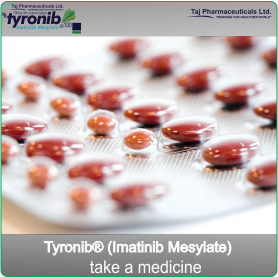Tyronib® (Imatinb Mesylate) ⇒ Manufacturing
Manufacturing Control Setup Taj GroupTest Equipment and Facilities : The manufacturing facilities are based in Valsad (Gujarat) and Raigad (Raigarh, Maharashtra) and operated by Taj Pharmaceuticals Ltd.
In our quest to be the leading manufacturer in the pharmaceutical industry and a CRAMS player of global standing; we aspire to meet and excel the highest industry standards. To this end, on the manufacturing front, we have designed and engineered our production facilities to the most rigorous benchmarks.
We have a modern ![]() facility for the production of sterile powder formulations, non-sterile oral formulations and active pharmaceutical ingredients.
facility for the production of sterile powder formulations, non-sterile oral formulations and active pharmaceutical ingredients.
- Modern QA, QC, Microbiological and PD Lab supported with high-tech equipment.
- Fully automated with electronically controlled operating system as per Good Automated Manufacturing Practice guidelines.
- Sophisticated Effluent Treatment Plant (ETP) with a capacity of 100,000 liters per day.
- Conforms to international environmental, health & safety regulations.
- All our manufacturing sites are WHO-GMP approved.
- In addition, we are a registered drug manufacturing facility with an impressive inspection record.
Our facility consistently meets and exceeds our own stringent quality assurance standards, administered by an Internal Quality Assurance team reporting directly to the Managing Director, as well as those imposed by regulatory bodies. IQ /OQ / PQ validations have been completed on all equipment to which these apply.
Our expertise APIs (CTD & formulation dossiers) will help us further enhance our own product range as well as the size and diversity of our toll / contract manufacturing business segment.
Modern methods like aqueous coating, tablet packing in combi-packs etc., are implemented in the manufacturing process.
The Sarigam plant is the ONLY plant in the world producing all the effective ranges of Anti-tuberculosis formulations namely Ethambutol Hydrochloride (B.P.), Rifampicin (B.P.), Isoniazid (B.P.), Pyrazinamide (B.P.), Rifampicin-Isoniazid (B.P.), Rifampicin-Isoniazid-Pyrazinamide (B.P.), Ethionamide (B.P.) and Prothionamide (B.P.) - all in Tablet form. Production of bulk actives such as Ethambutol, Rifampicin and Pyrazinamide are also undertaken at Valsad, Gujrat (India).
R & D activity is a continuous on-going process and the R & D Division at Sarigam has been duly approved by the Department of Scientific and Industrial Research, (DSIR), Government of India.
The Raigad Plant, which is involved in Fermentation activity has been suitably up-graded and manufactures products like - Lovastatin, Simvastatin, DMCTC, Gentamycin, Sisomycin, etc., The Plant also exclusively manufactures a veterinary product for a foreign multinational - in fact is the only manufacturer of this product in the world.
For More information visit www.tajpharma.com
Uses
Tyronib® (Imatinb Mesylate), is a targeted therapy used to treat certain types of Leukaemia and soft tissue sarcoma, it may also be used to treat other types of cancers as part of research trial.
Tyronib® (Imatinib Mesylate) may be used to treat:
- Chronic myeloid leukaemia (CML)
- A type of acute lymphoblastic leukaemia (ALL) called Philadelphia chromosome positive (Ph+ ALL)
- Gastro-intestinal stromal tumours (GISTs)
- A rare type of soft tissue cancer called dermatofibrosarcoma protuberans (DFSP)
- Other types of cancers as part of a research trial.
Important Safety Information
-
Pregnancy Category D:Imatinib can cause fetal harm when administered to a pregnant woman. There have been post-market reports of spontaneous abortions and infant congenital anomalies from women who have taken Imatinib.
There are no adequate and well-controlled studies with Imatinib in pregnant women. Women should be advised not to become pregnant when taking Imatinib. If this drug is used during pregnancy, or if the patient becomes pregnant while taking this drug, the patient should be apprised of the potential hazard to the fetus. - Nursing Mothers:Imatinib and its active metabolite are excreted into human milk. Based on data from three breastfeeding women taking Imatinib, the milk:plasma ratio is about 0.5 for imatinib and about 0.9 for the active metabolite.
- Pediatric Use:Imatinib safety and efficacy have been demonstrated in children with newly diagnosed Ph+ chronic phase CML and Ph+ ALL. There are no data in children under 1 year of age.
- Geriatric Use: In the CML clinical studies, approximately 20% of patients were older than 65 years. In the study of patients with newly diagnosed CML, 6% of patients were older than 65 years. No difference was observed in the safety profile in patients older than 65 years as compared to younger patients, with the exception of a higher frequency of edema. The efficacy of Imatinib was similar in older and younger patients.
_100mg_logo-header.png)





